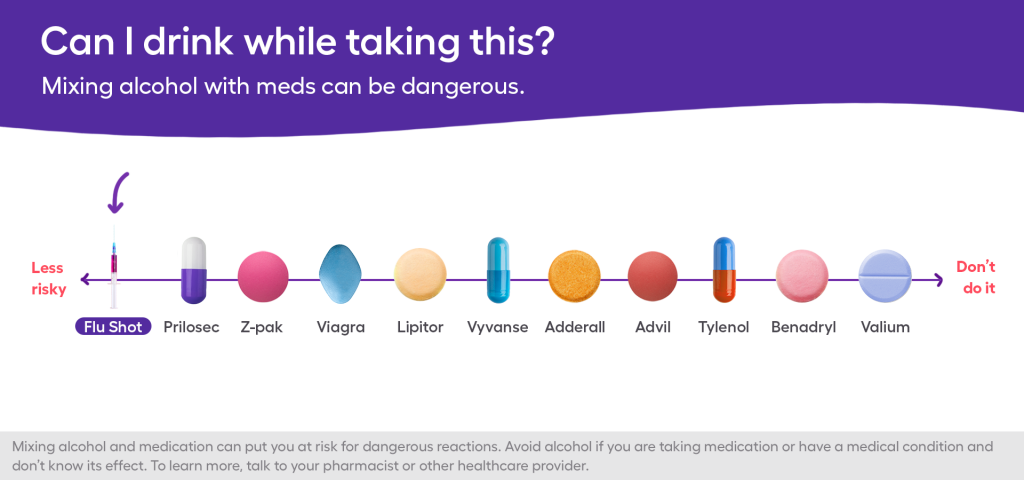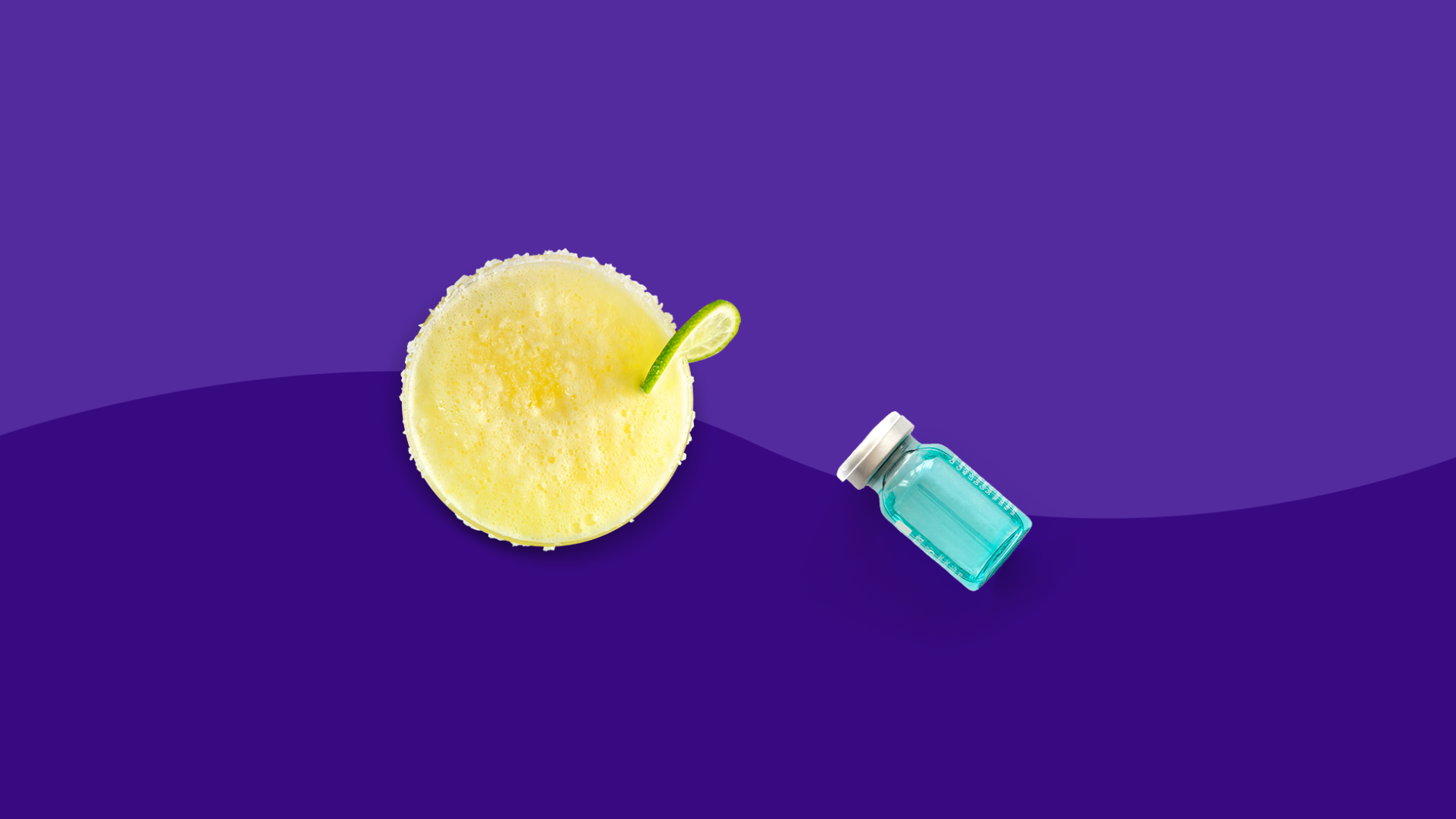Key takeaways
The FDA does not list alcohol as a contraindication for vaccines, but excessive drinking after vaccination can mask side effects and impair the immune response.
The CDC defines moderate alcohol consumption as up to one drink per day for women and two for men. Heavy drinking can suppress the immune system and increase the risk of sickness.
Vaccines like flu, shingles, tetanus, pneumonia, typhoid, HPV, and COVID-19 vaccines do not have known interactions with alcohol. Still, excessive alcohol consumption can exacerbate vaccine side effects and weaken the immune system’s response.
You passed your physical with flying colors, got a few vaccines to stay up-to-date, and you’re going out with friends tonight. Time to kick back and enjoy a glass of wine, but you start to wonder if that’s safe to do.
You likely know that there are many medications that can’t be mixed with alcohol—but what about drinking after you’ve been immunized?
Good news: The Food & Drug Administration (FDA) label information for various vaccines does not list alcohol as a contraindication. However, while drinking might not be harmful after most vaccines, there are still a few reasons to avoid drinking excess alcohol after you receive a shot.
Is drinking after vaccinations safe?
Generally, alcohol does not interact with vaccines. However, it’s still a good idea to avoid excessive alcohol consumption after a vaccine. Too much alcohol can mask the vaccine’s side effects, and you won’t know if the vaccine or the alcohol is causing a reaction. For example, alcohol can cause headaches, but so can many vaccines, such as Shingrix, the brand-name vaccine that prevents shingles (herpes zoster). Over 50% of adults aged 50-59 experienced headaches from Shingrix in clinical trials.
According to health officials at the Centers for Disease Control and Prevention (CDC), moderate alcohol consumption is defined as one drink or less per day for women and two drinks per day or less for men. Drinking too much alcohol on a regular basis can inhibit your immune system and affect your body’s ability to fight infection. According to the CDC, excess alcohol (15 or more drinks weekly for men, eight or more drinks weekly for women) can suppress your immune system, which increases your risk of getting sick.
If you decide to have a couple of drinks after your vaccine, drink in moderation, says Ramandeep Sidhu, MD, a board-certified vascular surgeon and founder of VIVAA-Vein Vascular Primary Care & Aesthetic Associates in Issaquah, Washington. He says excessive drinking over an extended time can weaken your immune system to the point where the vaccine won’t function as well as it usually would.
“You should refrain from drinking heavily, especially during the first two weeks [after receiving the shot], to maintain your immune system,” Dr. Sidhu says. Drinking too much alcohol and becoming intoxicated can impair the immune system so that the vaccine doesn’t work as well as it normally would.
Always double-check with your healthcare provider because they are familiar with your specific medical history and condition(s) as well as any medications you take that may also potentially interact with alcohol.
Can alcohol alter the effectiveness of a vaccine?
While alcohol is not contraindicated with vaccines per se, you may be concerned it could affect how effective the vaccine is. One study suggests that while excess alcohol consumption is harmful to the body’s immune system, moderate drinking (up to one alcoholic beverage a day for women and up to two alcoholic beverages a day for men) could possibly boost the immune system. However, this is still a poorly understood phenomenon, and individuals vary greatly—for example, a patient with a history of alcohol abuse should not attempt to use alcohol as an immune system booster. And according to the 2020-2025 Dietary Guidelines for Americans by the U.S. Department of Health and Human Services, if you don’t already drink, it’s not recommended that you start.
From a health perspective, not drinking at all is best. Perhaps more research will make the connection clearer, but for now, check with your healthcare provider before altering your alcohol intake.

Are there any interactions between alcohol and vaccines?
Let’s take a look at some of the most common vaccines and their interactions with alcohol. Remember, although a vaccine does not technically interact with alcohol, you should check with your healthcare provider before drinking alcohol before or after your vaccine.
Flu shot
Can you have the flu shot and alcohol, too? Alcohol does not interact with popular inactivated flu shots such as Fluzone, Afluria, Fluad, Flucelvax, Flublok, or Fluarix. But according to data from one small study, scientific evidence showed participants who drank alcohol regularly experienced more adverse effects after the vaccination, including fatigue, pain at the injection site, and body aches.
Shingles vaccine
What about the shingles vaccines and liquor? Shingrix and alcohol do not interact. Zostavax is another (less common) shingles injection; it is also safe with alcohol. Side effects of both shingles vaccines include injection site redness, swelling, pain, warmth, headache, and fatigue. As with other types of vaccinations, alcohol can make vaccine side effects worse.
Tetanus shot
Can you drink after a tetanus shot? The tetanus shot is typically given to adults combined with diphtheria and pertussis, referred to as Tdap. Some common brand names are Boostrix and Adacel. The tetanus shot and alcohol are compatible, but it’s best to discuss the use of alcohol with your doctor before getting the vaccine. It’s possible, as with any vaccine, excessive use of alcohol has the potential to increase side effects and reduce the immune system’s response to the vaccine.
Pneumonia vaccine
The pneumonia vaccines Prevnar 13, Prevnar 20, Pneumovax 23, and Vaxneuvance are all safe with alcohol. But these vaccines can cause drowsiness, fever, loss of appetite, headache, and injection site soreness/redness, side effects that may be worsened by heavy alcohol consumption.
Typhoid vaccine
The oral typhoid vaccine (Vivotif) should be taken on an empty stomach—meaning no food or alcohol—but you can safely drink alcohol later on. The injectable typhoid vaccine (Typhim Vi) can be administered without regard to food or alcohol and does not interact with alcohol.
HPV vaccine
Although many recipients of Gardasil 9 are too young to drink, those who are old enough to consume alcohol can do so safely.
COVID-19 vaccine
So, what about the COVID-19 vaccine? Can you drink after getting your COVID-19 vaccination or boosters? Both of the two-dose vaccines, the Moderna COVID-19 vaccine and the Pfizer BioNTech COVID-19 vaccine, contain drug label information that does not mention an interaction with alcohol. However, some people report side effects of these vaccines, like fever, chills, and headache—and alcohol could potentially worsen these symptoms. Therefore, it would be wise to avoid alcohol until you see how you feel from the COVID-19 vaccine.
What side effects can I expect from vaccines?
Most vaccines are well-tolerated and offer protection from serious, life-threatening diseases. The most common side effects with all vaccines are injection site reactions, such as redness, pain/soreness, swelling, or tenderness. Other side effects include mild body aches, fatigue, headache, fever, or gastrointestinal side effects like nausea, vomiting, or diarrhea. Alcohol can make vaccination side effects worse, especially if you drink excessively, and experts say it can tamper your immune response to the vaccine.
When should I worry about side effects after getting vaccinated?
If you’ve ever had a serious side effect or allergic reaction, such as trouble breathing, after a vaccine, you will need to inform your healthcare provider any time you get a vaccine. Before receiving any vaccine, though, your healthcare provider will review your medical history to ensure the vaccine is safe to receive.
Live vaccines, such as the MMR vaccine, should not be given to pregnant women. You can read more about the CDC guidelines for vaccinating pregnant women here.
Some vaccines should not be administered to patients with an egg protein allergy, such as Fluzone Quadrivalent. Flucelvax Quadrivalent and Flublok Quadrivalent are egg-free.
Gardasil 9 may be associated with fainting, so patients will be observed for about 15 minutes after a Gardasil 9 injection.
Your healthcare provider will have emergency treatment available in the case of a severe allergic reaction.
The bottom line
While vaccines are generally safe with small to moderate amounts of alcohol, it’s best to wait a day or two until the side effects dissipate. If you plan to drink anyway, check with your healthcare provider because everyone has individual circumstances that can affect their reaction to alcohol. And no matter what you decide, remember that regular heavy or binge drinking is not good for your immune system.
- Shingrex, National Library of Medicine
- Dietary Guidelines for Alcohol, Centers for Disease Control and Prevention (2022)
- Alcohol Use and Your Health, Centers for Disease Control and Prevention (2022)
- Could moderate alcohol intake be recommended to improve vaccine responses? Expert Review of Vaccines (2014)
- 2020-2025 Dietary Guidelines for Americans, U.S. Department of Agriculture
- The adverse events of influenza A (H1N1) vaccination and its risk factors in healthcare personnel in 18 military healthcare units in Korea, Japan Journal of Infectious Diseases (2011)
- What Everyone Should Know about the Shingles Vaccine (Shingrix), Centers for Disease Control and Prevention (2023)
- Diphtheria, Tetanus, And Acellular Pertussis Vaccine (Intramuscular Route), The Mayo Clinic
- Pneumococcal Vaccines, Centers for Disease Control and Prevention (2023)
- Moderna COVID-19 vaccine, DailyMed Drug label
- Pfizer COVID-19 vaccine, DailyMed Drug label
- Guidelines for Vaccinating Pregnant Women, Centers for Disease Control and Prevention (2022)



